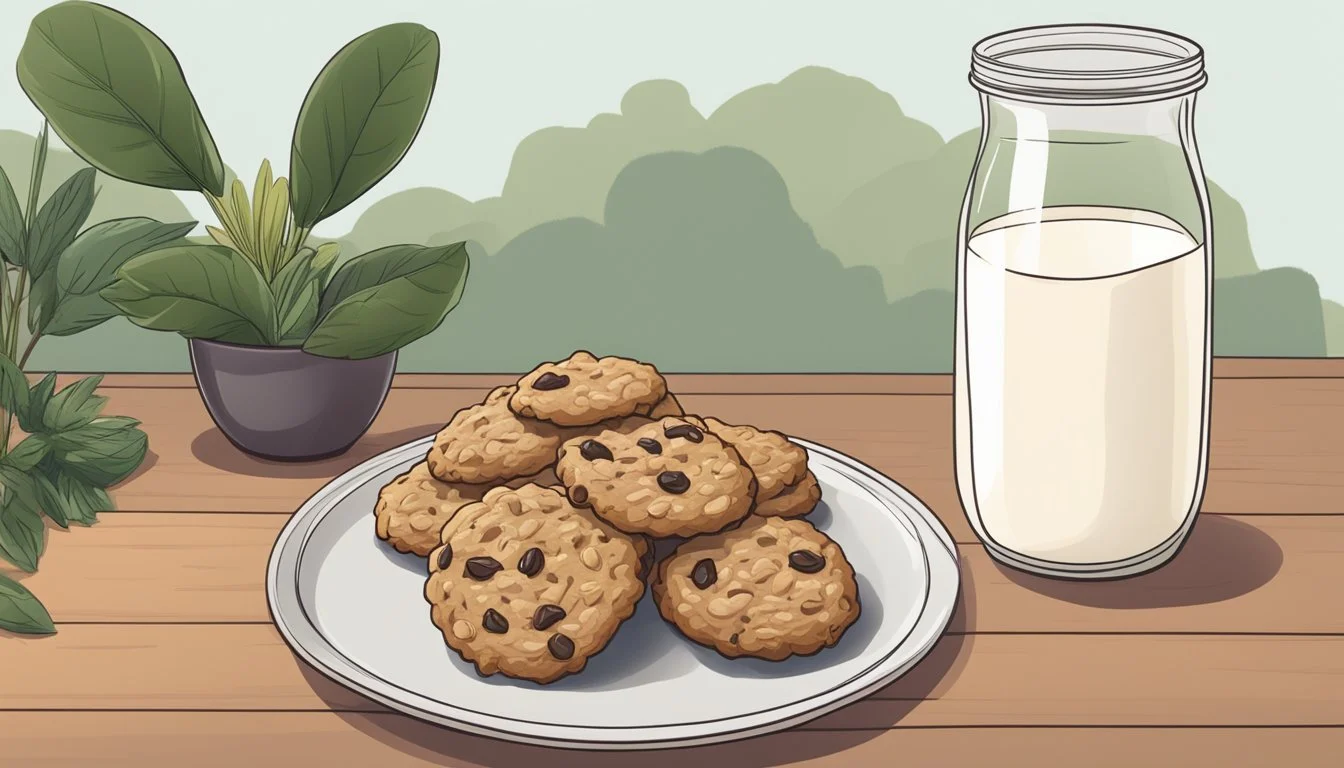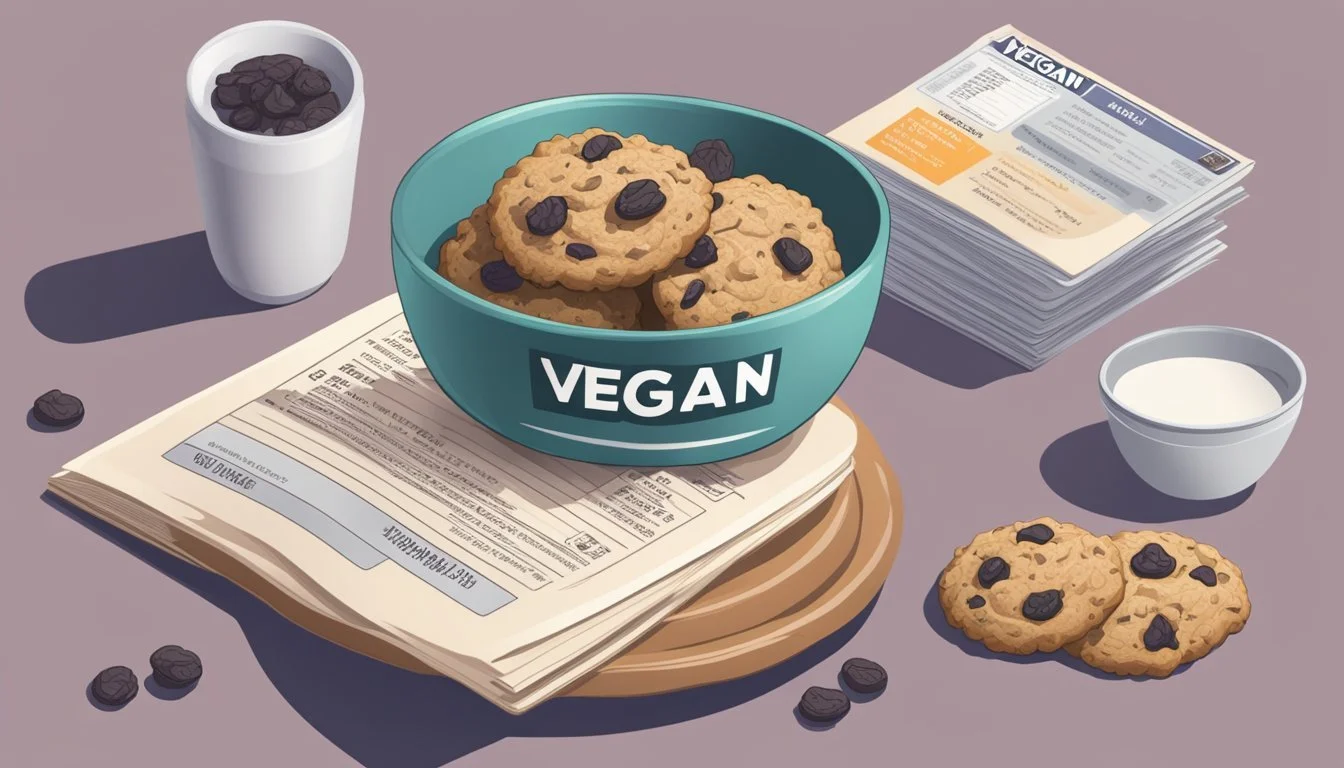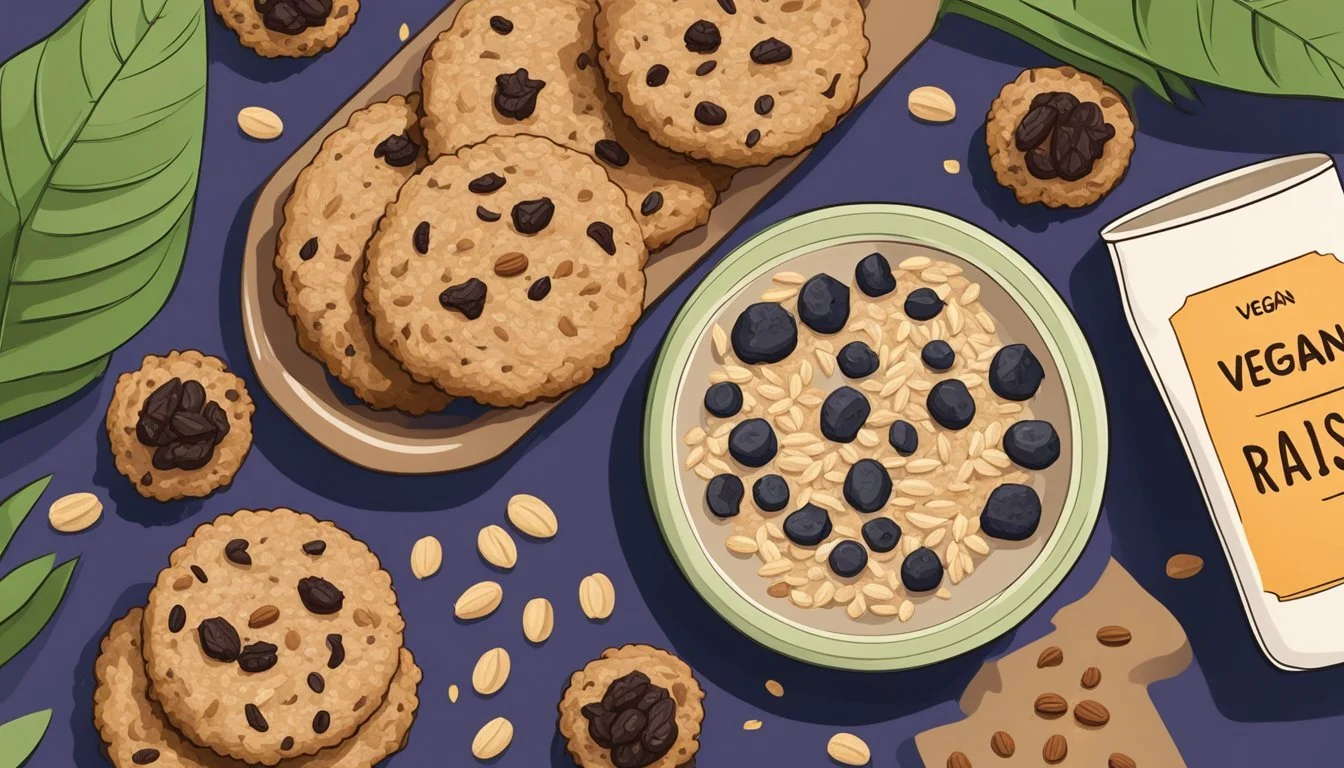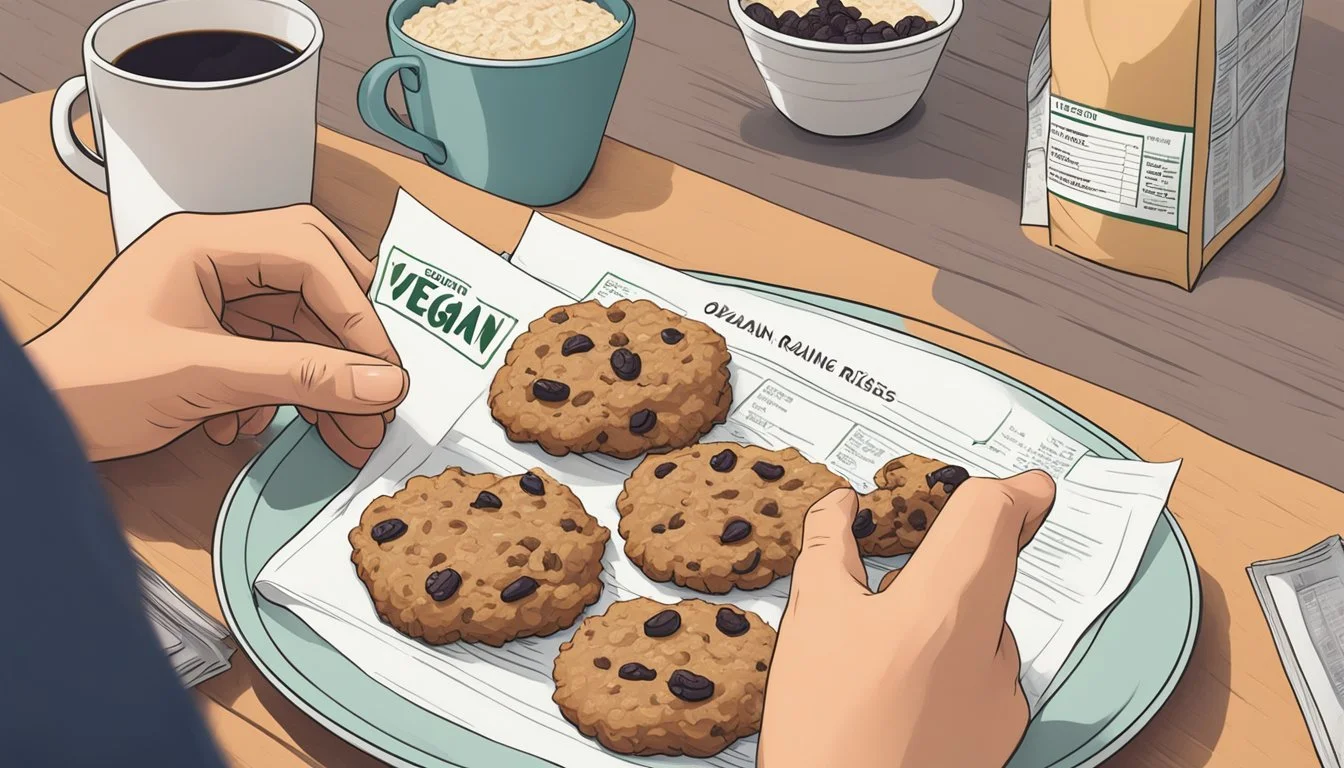Are Oatmeal Raisin Cookies Vegan?
Unveiling the Truth About Ingredients
When it comes to oatmeal raisin cookies, a classic comfort dessert, the question of whether they are vegan is not straightforward. Traditional oatmeal raisin cookies often include ingredients such as butter, eggs, and sometimes honey, which are not considered vegan. These ingredients are key to the rich flavor and chewy texture that many people associate with this beloved treat.
However, the increasing demand for plant-based options has led to a variety of vegan oatmeal raisin cookies becoming available. These vegan versions substitute the non-vegan items with plant-based alternatives. For example, butter can be replaced with vegan margarine or oils, eggs can be swapped for flax eggs or applesauce, and natural sweeteners like maple syrup or molasses can take the place of honey. Consequently, these changes not only make the cookies vegan-friendly but can also offer variations in taste and texture that might appeal to a wide range of dessert lovers.
The core components of vegan oatmeal raisin cookies—oats, raisins, flour, and spices—remain the same, ensuring that the essence of the cookie is preserved. These ingredients are inherently vegan and provide the signature hearty and chewy experience. Thus, whether seeking a vegan dessert option or catering to dietary preferences, it is clear that there are numerous ways to enjoy oatmeal raisin cookies without the use of animal-derived ingredients.
Ingredients Overview
When crafting vegan oatmeal raisin cookies, the selection of ingredients is crucial to ensure the final product is plant-based and matches the desired texture and flavor profile.
Oats and Flour Varieties
Oatmeal is the central ingredient, traditionally using rolled oats for their hearty texture. Flour provides structure, with all-purpose flour being the common choice. However, for gluten-free options, one can use gluten-free blends. Whole wheat flour offers a more robust flavor for those seeking whole grain benefits.
Sweeteners and Fats
Sweetness in vegan oatmeal raisin cookies can come from sugar or brown sugar, adding to the chewiness. Fats like coconut oil, vegan butter, or margarine keep cookies moist and tender. Applesauce or mashed banana can serve as healthier fat alternatives.
Additional Flavorings
To enhance the cookies' taste, use cinnamon and vanilla extract, which impart warmth and depth. Nutty elements like walnuts or pecans can be included for additional texture, while dried cranberries or vegan chocolate chips offer variations on the classic raisin theme.
Leavening Agents and Add-ins
Leavening agents like baking soda help the cookies rise. As for add-ins, raisins are essential; consider their plumpness and sweetness when selecting. Chocolate chips can be replaced with vegan chocolate chips, and for a nutty crunch, one might add walnuts or pecans.
Vegan Specific Ingredients
Ensuring the ingredients are vegan-approved means substituting conventional eggs and dairy. A flax egg (flaxseed meal mixed with water) can replicate an egg’s binding properties. Non-dairy milk, such as almond or oat milk, is used in place of cow's milk. Always check for animal by-products when selecting ingredients.
Vegan Baking Techniques
When baking vegan oatmeal raisin cookies, the techniques used in preparation, mixing, and baking can influence the texture and flavor of the finished product. Vegan baking techniques often involve specific substitutes and methods to ensure the cookies meet vegan standards without compromising quality.
Preparation and Preheating
Before starting any baking project, it's essential to gather all necessary equipment and ingredients. For vegan cookies, this includes a mixing bowl, standard or stand mixer with a paddle attachment, and baking sheets lined with parchment paper. Preheating the oven to the correct temperature is a critical step that should not be overlooked. Ideally, one should preheat it to 350°F (177°C), a common temperature for baking cookies, which ensures a consistent baking environment from the onset.
Mixing Methods
In vegan baking, the mixing process often begins with creating vegan substitutes for common non-vegan items. This typically involves preparing a flax egg by mixing flaxseed meal and water and allowing it to thicken to mimic the binding properties of an egg. Using a mixing bowl, one should first beat the vegan butter and sugars until creamy. A stand mixer with the paddle attachment is perfect for this job, but a hand mixer can also be sufficient. Once the flax egg, vanilla, and other wet ingredients are incorporated, the dry ingredients, including flour, oats, and leavening agents, are added gradually, ensuring they are mixed evenly without overworking the dough.
Baking and Cooling
After mixing, spoon or scoop the cookie dough onto the prepared baking sheet, ensuring enough space between each to allow for expansion. The cookies should bake until they are golden brown, which usually takes around 8-10 minutes, depending on the size. Proper baking is important; it develops flavors and sets the structure. After removal from the oven, the cookies should be allowed to cool on the baking sheet for a few minutes. They can then be transferred to a wire rack to cool completely. This step prevents the cookies from becoming too soggy or falling apart.
Texture and Consistency
When crafting vegan oatmeal raisin cookies, the texture and consistency are paramount. These attributes largely dictate the consumer's eating experience, whether they favor a chewy center or a crisp edge.
Achieving Desired Texture
The quest for the desired texture in oatmeal cookies leans on the precision of the baking process. For a chewy texture, one should incorporate a balance of moist ingredients, like plant-based butter or oil, and dry ingredients. Using a cookie scoop not only ensures uniformity in size but also in baking time, which is crucial for consistent texture.
Chewy: To achieve a chewy cookie, one may opt for brown sugar or choosing to under-bake the cookies slightly, monitoring them closely as they approach the final minutes in the oven.
Crisp Edges: For cookies with crisp edges, a higher baking temperature can help, as can the inclusion of ingredients like granulated sugar which promotes spreading and therefore thinner, crisper edges.
Adjustments for Special Diets
Vegan oatmeal raisin cookies can cater to various dietary needs while maintaining texture integrity.
Gluten-free: By substituting traditional flour with gluten-free alternatives, one ensures the cookies are suitable for those with gluten sensitivities. Gluten-free flours may alter the cookie's structure; hence, additives like xanthan gum might be necessary to mimic gluten's binding properties.
Oil-free: Those preferring an oil-free diet may replace oils with fruit purees or nut butters. This can still yield a moist cookie, though the texture may be less crisp and more cake-like.
Each ingredient and method impacts the final texture and consistency of oatmeal raisin cookies. Precise measuring, temperature control, and timing are essential elements in achieving the ideal cookie experience for all, including those on special diets.
Nutrition and Health Information
When considering the nutritional profile of oatmeal raisin cookies, particularly vegan variations, it's essential to examine their calorie and macronutrient distribution, the vitamins and minerals they provide, and the common food allergens they may contain.
Caloric and Macronutrient Content
Vegan oatmeal raisin cookies typically contain a balanced mix of carbohydrates, proteins, and fats. A serving size, which might consist of one or two cookies, contains:
Calories: Approximately 100-150
Fat: 3-5g (with lower levels of saturated fat and a presence of polyunsaturated and monounsaturated fats)
Carbohydrates: 15-25g
Protein: 2-4g
The specific amounts can vary based on the recipe and the size of the cookies.
Vitamins, Minerals, and Fiber
The ingredients in vegan oatmeal raisin cookies contribute to their vitamin and mineral content. Here’s a brief overview:
Fiber: Oats are a good source of fiber, which supports digestion.
Iron: Sometimes present in fortified ingredients or naturally occurring in oats and raisins.
Calcium & Potassium: Raisins can contribute small amounts to the total.
Vitamin A & Vitamin C: Typically not present in significant amounts unless added.
The whole grains in oats provide substantial fiber, enhancing the cookie’s healthfulness.
Considerations for Food Allergies
Certain ingredients in vegan oatmeal raisin cookies might trigger food allergies:
Gluten: While oats are naturally gluten-free, they are often processed in facilities that handle gluten-containing grains, which can lead to cross-contamination.
Nuts: Some recipes include nuts or are produced in facilities that handle nuts, presenting a risk for individuals with nut allergies.
Consumers with allergies should look for certified gluten-free oats when necessary and review ingredient labels for potential allergen exposures.
Storage and Shelf Life
When storing oatmeal raisin cookies, whether they are vegan or non-vegan, maintaining their freshness is crucial. Proper storage methods prolong the enjoyable taste and texture of the cookies.
Short-Term Storage
For short-term storage, oatmeal raisin cookies should be kept in a cool and dry place such as a pantry. They are best stored in an airtight container to prevent them from absorbing moisture and odors, which helps to retain their original flavor and soft texture.
Pantry Storage: Up to 1 week
Recommended Container: Airtight container
Extending Freshness
To extend the freshness of oatmeal raisin cookies beyond a week, freezing is an effective method. Cookies should be placed in a single layer on a baking sheet to freeze initially. Once solid, they can be transferred to a freezer-safe airtight container or a heavy-duty freezer bag. This prevents them from sticking together and ensures that they maintain their quality.
Freeze: Up to 3 months
Freezing Method: Single layer freeze, then transfer to container or freezer bag
Labeling the container with the date of freezing can be helpful for keeping track of how long the cookies have been stored. When ready to enjoy, defrosting the cookies at room temperature ensures they retain their desirable texture.
Serving Suggestions
When serving vegan oatmeal raisin cookies, one's presentation and pairing choices can elevate the simple act of indulging in cookies to a more delightful experience. Vegan oatmeal raisin cookies are versatile in nature and can suit various occasions, whether it's a hearty breakfast or a sweet dessert.
Accompaniments and Variations
Breakfast Pairings:
For a wholesome breakfast, serve vegan oatmeal raisin cookies with a side of fresh fruit, such as sliced bananas or berries, and a glass of plant-based milk or vegan yogurt.
Cookies can be crumbled as a topping over a bowl of oatmeal or cereal for added texture and flavor.
Dessert Options:
Enjoy these cookies as dessert with a scoop of vegan ice cream or alongside a cup of herbal tea or coffee.
Warmed cookies topped with a dollop of vegan whipped cream can serve as a delightful treat.
Tips for Customization:
Add a variety of nuts like chopped walnuts, pecans, or even almonds for an additional crunch and nutritional boost.
Mix in vegan chocolate chips or chunks to create a hybrid oatmeal chocolate chip cookie.
For those who prefer a little tartness, dried cranberries can be a suitable substitute for raisins.
Using the right pairings and variations, vegan oatmeal raisin cookies can cater to a range of tastes and occasions, each bringing its own unique flair to the table while maintaining the integrity of the vegan lifestyle.
Common Questions
When exploring vegan cookie recipes, particularly for oatmeal raisin cookies, bakers often have queries about ingredient variations, substitutions, and best practices. This section addresses some of those common concerns with specific guidance tailored for the preparation of this tasty treat.
Recipe Variations
Many recipes for vegan oatmeal raisin cookies offer flexibility in terms of ingredients. Oats, for instance, come in different forms such as instant oats and old-fashioned rolled oats. While both can be used, old-fashioned oats tend to provide a chewier texture preferred in these cookies. Additionally, mix-ins like nuts or chocolate chips can be included for diverse flavors.
Baking Substitutions
Vegan baking often requires substitutions for traditional ingredients like eggs and butter. A popular egg replacer is flaxseed meal, which when mixed with water, creates a "flax egg". This not only binds the cookie dough but also adds to the health quotient of the cookies. Vegan butter is a common alternative to regular butter, and unsweetened applesauce can be used to reduce the amount of fat without compromising the cookie's moisture.
Ingredient Substitution Butter Vegan butter or coconut oil Egg Flax egg (1 tbsp flaxseed meal + 2.5 tbsp water) Brown Sugar Coconut sugar or other alternative sweeteners Molasses Maple syrup or agave nectar (for sweetness)
Tips for First-Time Bakers
For first-time bakers, it's crucial to follow the recipe precisely and use the right tools. Easy to make doesn't mean careless preparation. A cookie scoop ensures uniform size, leading to even baking. Ingredients should be at room temperature to blend seamlessly, especially vegan butter and sugar—be it granulated or brown sugar. Baking time may vary, so one should keep a close watch after the minimum time mentioned in the recipe to prevent overbaking.
Recipes and Tutorials
When it comes to vegan oatmeal raisin cookies, many recipes provide simple guides to create this classic treat without the use of animal products. The fundamental approach involves substituting common non-vegan ingredients with plant-based alternatives. These cookies are not only easy to make but can also be customized according to personal taste preferences.
Key Ingredients:
Vegan butter or oil
Brown sugar or another sweetener
Flax eggs (ground flaxseed mixed with water)
Vanilla extract
Flour (gluten-free if necessary)
Rolled oats
Baking soda
Cinnamon and other spices (optional)
Raisins
Salt
General Steps:
Preheat the oven to the temperature specified by the chosen recipe, often around 350°F (177°C).
In a large bowl, cream together the vegan butter and sugar until smooth.
Add the flax egg and vanilla extract, and mix well.
Gradually incorporate the dry ingredients -- flour, oats, baking soda, cinnamon, and salt -- into the wet mixture.
Fold in the raisins, evenly distributing them throughout the dough.
Place the cookie dough in small heaps on a parchment-lined baking sheet, spacing them adequately.
These cookies typically bake in about 12-15 minutes. They should look slightly golden around the edges once done. Remember, vegan oatmeal raisin cookies can vary in texture from chewy to crispy, depending on the recipe and baking time.
Recipes can be easily found and followed online from sources like "Nora Cooks" or "Sweet Simple Vegan." They provide step-by-step tutorials that cater to both beginner bakers and seasoned cooks alike.
Conclusion
While traditional oatmeal raisin cookies typically contain animal-derived ingredients like eggs and butter, making them unsuitable for vegans, many variations of vegan oatmeal raisin cookies exist.
Key takeaways:
Vegan oatmeal raisin cookies use plant-based substitutes such as flax eggs, derived from flaxseed meal and water, to replace chicken eggs.
Vegan butter or oils often take the place of dairy butter, and plant-based milks are used instead of cow's milk.
Sweeteners must also be considered; options like maple syrup and molasses can be used instead of honey or other non-vegan sweeteners.
Preparation Tips:
Always preheat the oven, as a consistent baking temperature is crucial.
Use a silicone baking mat or parchment paper to prevent sticking without the need for additional grease.
The cookies may not spread much, so shaping them before baking is important.
Vegan Ingredient Swaps:
Non-Vegan Ingredient Vegan Swap Eggs Flax eggs Dairy Butter Vegan butter or plant oils Cow's Milk Plant-based milks Honey Maple syrup, molasses, etc.
Individuals following a vegan diet can undoubtedly enjoy oatmeal raisin cookies by using these alternatives. It is important to read all ingredient labels to ensure each component complies with vegan standards. Enthusiasts can either follow recipes that are specifically crafted to be vegan or adapt traditional recipes with suitable vegan ingredients.









